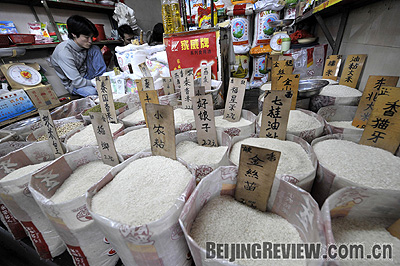|

PRICEY RICE: The domestic rice prices have increased-partly because of the international price surge-but still remain at a stable level
The rice price surge has touched the hearts of many. Since April this year, the international rice price has surmounted $1,000 per ton, and is continuing to increase. Statistics from the Chicago Board of Trade showed in the past 12 months that rice futures escalated 75 percent, far outpacing the 30 percent growth rate of corn and soybean prices.
The United Nations Food and Agriculture Organization warned in February that 36 countries would face food shortages this year. At the end of June, global rice supplies hit its lowest point since 1984, standing at 72.1 million tons. In the meantime, major rice exporters like Viet Nam, India and Egypt have all suspended rice exports since March. Take Viet Nam for instance. In the past six months, the consumer price index (CPI), a barometer for inflation, has been soaring. In March, Viet Nam's CPI soared 19.3 percent, with food price growing an astonishing 30.6 percent. Many developing countries are challenged by the same problem.
The falling rice inventory and shrinking rice supply further add pressure to global food prices. A research report from CITIC Securities Co. Ltd. revealed that in the past three months, rice prices in Thailand, a global benchmark, soared almost 70 percent, the highest rise in 34 years. Along with that is a 25-percent increase of the international price for rice.
China is a large agricultural country with a huge population, hence its demand for food is high. However, the current skyrocketing international rice price has not caused significant fluctuations in the domestic rice market. Chinese Premier Wen Jiabao stated that China should be mostly dependent on itself for rice and can feed itself with domestic rice.
China is one of the major rice exporters. Last year, China's grain output surpassed 500 billion kg, an increase of over 70 billion kg compared with that of 2003. Among the 2007 total, rice output was around 185 billion kg, growing more than 26.5 billion kg from that of 2003. Over the years, the average yearly rice consumption stays around 180 billion kg. Judging from the abovementioned figures, China is abundant with rice supply amid international rice price surge.
Rice harvests in recent years have further strengthened inventory. Currently, the Chinese Government has 150 million-200 million tons of reserve grains, twice the amount of the world's average. In traditional rice consumption areas like Shanghai, Zhejiang, Fujian, and Guangdong, the local rice reserve can sustain six months of demand.
To secure rice supply in southern provinces, the government strengthened supervision over rice flow and exports, making sure rice from northeastern rice production bases can be transported efficiently to areas in need. The government hopes to maintain the rice supply and price at a stable level.
JP Morgan Chase & Co.'s recent research report also showed China's dependence on rice imports is very low, accounting for mere 0.3 percent of total rice consumption. In the short term, rising international rice prices will not pose a major threat for the domestic supply and demand.
However, in the long run, the rice price hike pressure cannot be ignored. Mao Changqing, analyst with CITIC Securities, stated several reasons for possible rice price hike. First, the overall cost hike of rice production will be ultimately transferred to the consumers. Second, the low rice price will hurt farmers' enthusiasm for growing rice. Moreover, shrinking amounts of arable land will pose heavy pressure to future supply.
This year, the government raised grain subsidy up to 1,200 yuan ($171) per hectare. But the farming cost will surge to 3,000 yuan ($429). Chen Weifu, a farmer in Sheyang County in Jiangsu Province, said, "The policies are well intentioned. But compared with the growth speed of agricultural material prices, the subsidy is too little."
Because farmers cannot get much profit out of rice production, rice output has dropped for four consecutive years. It is estimated the early rice quantity will be 850 million kg less than that of last year.
Moreover, the transportation cost for rice is also rising. In April, the road transportation cost in northeastern provinces rose 20 to 30 yuan ($2.85-$4.29) per ton. Mao Changqing contended it was due to the fast price rise of industrial goods. "Since agricultural product prices are controlled by the government, the price change lags behind other goods. But ultimately, the cost surge will be reflected on rice price increases," Mao said.
As for the future changes of rice prices, Yin Daqing, a grain and edible oil wholesaler in Beijing, said the rice price would go up in the future, due to higher costs. Meanwhile, the rice price fell to record lows in the past two years, and technically, it must surge after two years' downturn.
Yin believes the Chinese rice prices will not soar as they did in the international market. Yin said the government had a strong control over the rice market, and China is dependent on its own rice supply, and the international market has little influence. | 